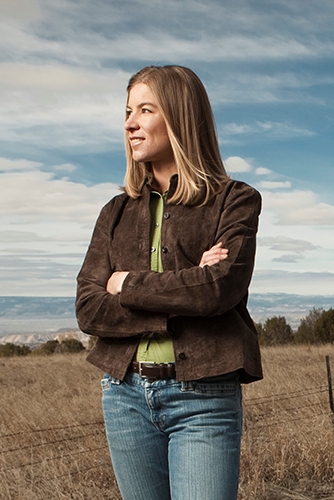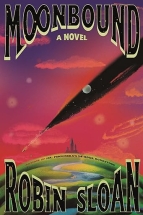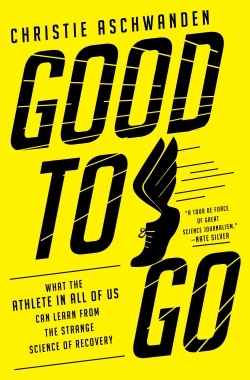
Library Author Series: Christie Aschwanden
- Library Hall
Twenty years ago, recovery for athletes simply meant rest. Today, sports recovery has become big business—a growing industry making millions of dollars each year. Professional and casual athletes alike engage in an “arms race” to find the perfect food, technique, or technology that will help them recover faster and perform better. In Good to Go: What the Athlete in All of Us Can Learn from the Strange Science of Recovery, acclaimed FiveThirtyEight science writer Christie Aschwanden takes an engaging, critical, and often humorous view at the hollow buzzwords, hard science, and deep weirdness that is the booming recovery industry. From infrared pajamas and sleep trackers to ice packs and cryochambers, Aschwanden investigates the claims of these recovery services and products—even subjecting herself to some of these methods—and dives into the scientific evidence to answer the question of how the body can best rebound and recover from athletic training and achieve peak performance. Good to Go cuts through the hype and separates what’s helpful from what is probably useless (and what might actually be harmful).
Sports science is an inherently difficult subject to study. Small effects can make a big difference in performance, but they’re hard to pin down with certainty, and this uncertainty can be exacerbated when corporate profit motives and marketing departments intervene. With this in mind, Aschwanden documents how sports drink companies came up with a problem for their products to solve, and how sometimes the cure can be more dangerous than the condition—in the case of overhydration, it can even be deadly. She demonstrates how even well-meaning scientists can be led astray when they fixate on the things they can measure instead of the things that matter, and how preliminary evidence can become dogma before it’s been properly verified.
Again and again, Aschwanden finds enticing claims backed by little more than sketchy science. Heat is rebranded as “infrared radiation” and built into celebrity-branded pajamas. Massage tools, compression clothing and an endless array of gadgets and products are marketed with promises that they’ll increase blood flow despite the fact that athletes and even most casual exercisers already have excellent circulation. Products claim to reduce soreness by clearing lactic acid, a substance long ago debunked as a source of muscle soreness. Even old standbys like icing and cold therapy have their scientific critics.
So what works? Aschwanden finds plenty of things worth trying, even if many of their benefits come from a ritualistic placebo effect. In the end, she finds that the most successful and effective recovery methods aren’t found in a lab or nutrition label—they’re the basics: rest and sleep. Science shows that sleep and meditative rest are key to post-exercise recovery, which may explain why Olympic skiers schedule naps into their training and military members use sensory deprivation chambers. The recovery industry has already jumped to monetize sleep with apps and devices to implement and track an ideal rest/sleep regimen.
For fans of science writing and athletes of any level, Aschwanden’s reportage is entertaining and engaging, extensively supported with keen observations and fascinating anecdotes (Usain Bolt’s 2008 Olympic performance was fueled by a 100-Chicken-McNuggets-a-day diet). In the face of the recovery industry’s grand promises and increasingly expensive products, Good to Go is a refreshing, humorous investigation of the business and science of sports recovery.
About the Author
Christie Aschwanden is the lead science writer at FiveThirtyEight and a former health columnist for the Washington Post. A finalist for the National Magazine Award, her writing has appeared in Outside, Discover, Smithsonian and O, The Oprah Magazine. She was a high school state champion in the 1,600-meter run, a national collegiate cycling champion, and an elite cross-country skier with Team Rossignol. She lives and occasionally still races in western Colorado.
This community talk is free.
About the Library Author Series
Bud Werner Memorial Library presents an ongoing program of author talks throughout the year. These are free community events held in Library Hall, where a diverse award-winning range of visiting authors speak about their literary works and their writing processes. Each talk is followed by a Q&A and an opportunity to have authors sign copies of their books.
Books will be available for sale and author signing courtesy of Off the Beaten Path Bookstore.















